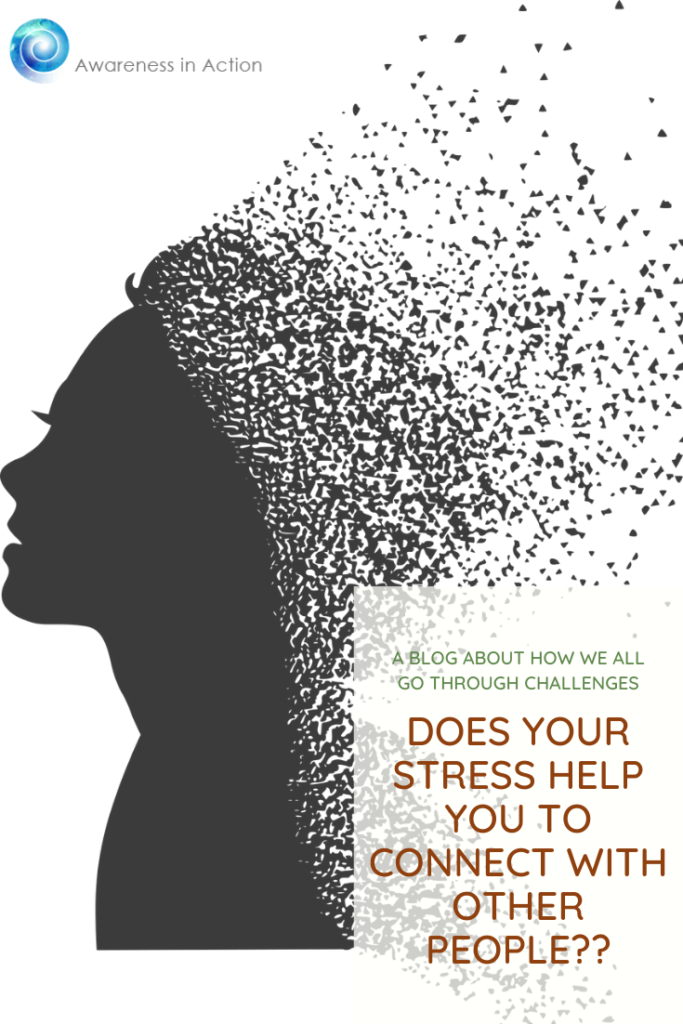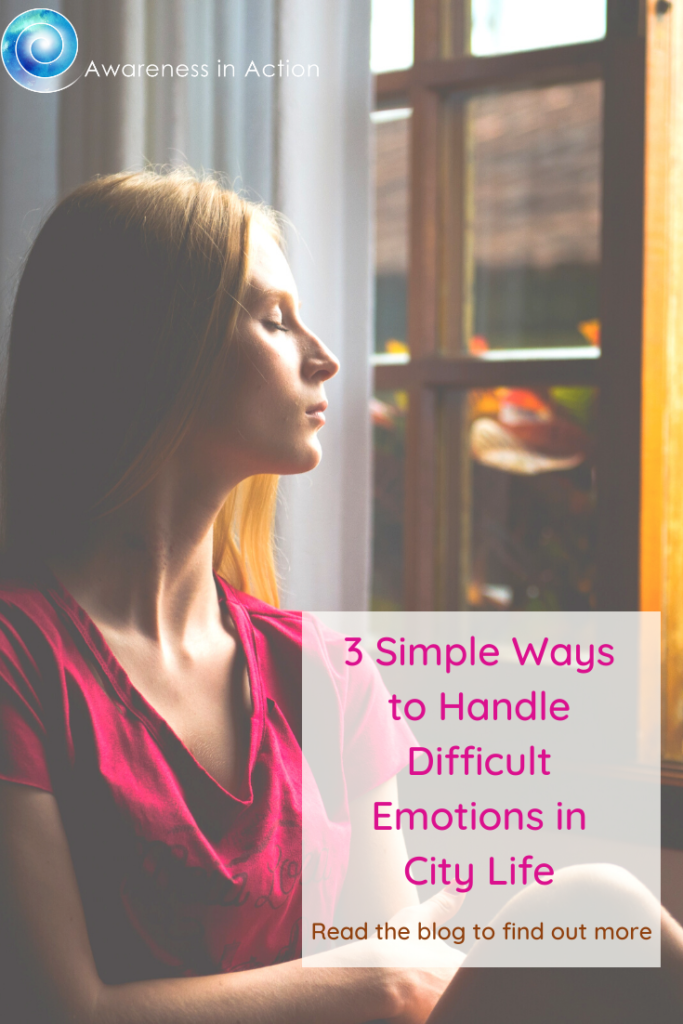
How to Make Your Commute Benefit Your Working Day
How to Make Your Commute Benefit Your Working Day A free e-course delivered to your inbox each day for 5 days Whether we go by metro, car, or bus; whether we cycle, walk or take the tram most of us spend lots of time every day getting to and from work. Have you ever...
How Does Your Stress Help You Connect With Other People?
My niece is stressed at the moment because she has an end-of-year presentation for her PhD. My neighbour has been stressed for some time because she has a mysterious leak in her shower, which the plumber has so far been unable to fix. A colleague of mine is on extended sick leave due to high blood pressure and has been told to avoid anything likely to cause her stress. My friend had a headache for three days because he was stressed with over-work.
Divorce, bereavement, moving to a new house and even going on holiday all rate high in the stress scale. Troubles at work, economic instability and unemployment are also possible sources. We can even feel stress if caught in traffic or standing in a slow-moving queue at the airport. When we worry about our families, our health, our job, our weight, we are creating scenarios in the mind that can create stress. A short-term physical crisis, such as falling over or scalding an arm can be termed stressful, as can longer-term physical challenges like facing chronic illness or disability.
What is stress?
We use the word ‘stress’ to cover a multitude of experiences—things we are afraid of, things we don’t like, feelings we have, worries that plague us—we refer to all of them as stress. So, we find ourselves using stress to describe moods we have, sensations in our bodies, our reactions to events around us, things happening to us, or things we are worried will happen to us.
In fact, our stress response evolved to help us avoid threat and survive as a species. Our bodies respond to stress in much the same way as any other mammal. However, the way this works in modern life it is not so simple. We subject ourselves to low grade stress for long periods of time. This means that our bodies are continuously being subjected to all the effects of the stress response even when we do not need it.
We get stressed by the very things we created in order to make our lives easier. When my internet goes down it drives me crazy. If I have computer trouble it feels, it can cause stress.
Having a flat tyre is not usually a life-threatening situation and yet it can cause our stress to erupt. Once we have got upset, it is hard to find our off switch and reset. The stress tends to rumble on. Any other mammal experiencing a stressor being removed simply returns to its normal activity. If a zebra escapes from the lion who is trying to eat it, it just goes back to grazing.
On top of that, as humans we have the capacity to think, imagine, and project. No zebra would understand how anyone could lie awake at night worrying about a presentation that they have to make at work the next day. When we worry, we are causing ourselves stress about stuff that might not ever happen.
How we react
We can also help ourselves by looking more closely at what is going on for us when we talk about being stressed. Often we say we are stressed when things are simply not going the way we want them to—we just miss the bus we were running for, the person before us in the supermarket picks up the last loaf of our favourite bread, a colleague at work does not perform how we think they should.
Of course, all these things can be annoying, but we can tip them over into stressful situations by how we react. If we shrug and look for the next bus coming along instead of cursing the driver for not waiting for us; if we mentally offer the bread to the person who got there first instead of resenting them and if we take the time to talk to our colleague to find out why their performance is under-par we can things on a manageable level and avoid a full-stress impact.
There is a Buddhist teaching about two arrows. It describes how when something difficult happens we suffer and feel pain, as if being shot by an arrow. That in itself is intense enough but then we often react to what is happening by complaining, blaming, or hitting out. The pain that this causes us is like being shot by a second arrow. Maybe we cannot avoid the first one, but we do have some choice about the second one.
Stress is inevitable
Hans Seyle, the father of stress research, once said that if you do not experience stress, you must be dead! We know that life is full of challenges. Some are huge and seem overwhelming. Many are small and relatively unimportant in themselves but can add up to a lot of hassle. Training ourselves to accept this, rather than fight it is can be a big help in working with stress.
Meditation can help with this. It helps us become more present, which cuts our habit of ruminating over our worries. Our perspective opens up and we are less likely to take things so personally. Through meditation we can build resilience and learn to how to come back more quickly from a difficult experience.
We can also learn to be more kind to ourselves and stop beating ourselves up about things that go wrong. Telling ourselves off for finding things hard is certainly being hit with two arrows, instead of just one.
Understanding the stress of other people
When we can take a look at how we react, as well as beginning to accept the inevitability of stress it opens up some space. Then we can look around us and see how stress affects other people.
Maybe we find ourselves having to drop into our local super-market on the way home from work. If we take the time to look around us as we push our trolleys through the laden shelves, it is not hard to find opportunities to observe many of the ways we human beings experience stress.
Consider the middle-aged man in a smart suit buying an easy-to prepare meal for one. Perhaps he is recently divorced, living alone for the first time in years and dealing with the stress of change and upheaval. Spare a thought for the young mother with a baby in a buggy and a toddler clinging round her legs. She looks as if she has not had a propernight’s sleep for two or three years. The lounging teenage boy sulking around the soft drinks has an air of aimlessness and boredom about him. Maybe because he left school with such high hopes and now does not seem to be able to find any kind of job that lives up to his dreams. Take care as you pass the older woman, walking carefully, who underwent major surgery two months ago and is feeling low and vulnerable as she tries to get her strength back.
Recognising our shared humanity
As we select the items, we need to cook our evening meal, perhaps we are rubbing shoulders with people suffering from exam nerves, having relationship problems, shouldering the care of elderly relatives–the list is endless.
If we can create space around our own stress, it enables us to see more clearly what is going on for other people. Recognising stress in other people brings home how we are all in the same boat. Whatever our differences, we all just want to be happy and avoid suffering and pain. Yet we know that life brings challenges that we all need to face from time to time.
When we allow ourselves to take account of the difficulties other people face, it opens our hearts. Instead of being focused on our own problems we find room for concern for those of other people. We feel more connected with others and less likely to isolate ourselves with our own worries.


You might be interested in this new zoom+online course which starts on 15 June 2021 HOW DO YOU WANT TO FLOURISH IN YOUR RIPE OLD AGE?
Awareness in Action is dedicated to building a community of people interested in living a life of meaning and purpose based on sustainable wellbeing. If you would like to join with us, you could make a start by sharing and commenting on the ideas you find in the blogs on these pages. Your story is part of our journey.

3 Simple Ways to Handle Difficult Emotions in City Life
For many of us, city life is crowded, busy, noisy and full of difficult emotions. We rush to work, along with all the other thousands of hurrying people. There’s traffic to negotiate, or crowded road crossings. All the time we are surrounded by adverts and billboards urging us to buy all kinds of things. There are countless pictures of glamorous models living perfect, wonderful lives that seem very distant from our daily routine. We might be aware of a vague longing for all kinds of things beyond our reach.
At the end of our working day we, have to do it all over again but now everyone is frantic to get home and in even more of a hurry. Perhaps we need to struggle through the supermarket crowds to pick up something for supper before we finally reach home. Even then, we cannot be sure of any peace and quiet. Maybe the neighbours are arguing, or someone across the road is playing loud music. One of my neighbours likes to do his washing late at night and everyone in the building can hear his ancient washing machine pounding away, as we get ready for bed. Once we are in bed, there is no guarantee things will settle down. We have a group of local teenagers who gather in the entrances of apartment buildings across the way and hang out until the small hours.
In the midst of all this our emotions can be pulled this way and that—irritations with things that go wrong, longing for things we cannot have and a vague, uncertain feeling of wanting things to be different. It’s exhausting and certainly adds to our stress.
So, what can we do? Here are three ways that I use to work with my difficult emotions as a city dweller.
1. Pay attention
When there are lots of things going on around you, it is all too easy to get pulled in all sorts of directions that have nothing to do with what you, yourself are doing at the present time. Have you ever walked along a familiar street and when you arrive at your destination, wondered how you got there? If you think about it, our lives are made up of many, many present moments—and it is important for us to notice this.
In 2010 two psychologists at Harvard University carried out some research into how we handle this moment-to-moment awareness. They discovered that for almost half of our waking hours we are thinking about something different to what we are doing, and that this does not make us happy. One of the times when they found most people’s minds were somewhere else was on their commute!
So, how do we pay attention? On a simple level—by trying to be mindful of what we are doing in each moment. If we are in a supermarket, we try to be present to walking up and down the aisles, choosing our goods and going to the checkout. If we find our minds drifting back to something else that happened in the day or anticipating what might happen later—then we just bring our attention back and let it rest.
The best way to learn how to make this part of your life is through meditation. Meditation is a reliable way of coming to know yourself and how you react. It helps us to calm our minds down and to be able to work with them more effectively.
How does this help in working with difficult emotions? It stops us from ruminating on something that might have annoyed us earlier or worrying about something challenging we need to do later. We tend to relive our upsets over and over again, which means that we draw out and exaggerate the emotions that go with them.
2. Don’t go there!
If we have been paying attention as we go through our day, there is more chance that we will notice if a difficult emotion is being triggered by something that is going on. When my neighbour’s washing machine starts up at 11.30pm, and I feel myself getting irritated I have a routine that I go through. I remember that there’s nothing that I can do about it; that he does not mean any harm (he’s actually a very nice guy), and if I get worked up then I won’t be able to sleep anyway. I call it, Don’t Go There!
You can try it anywhere for lots of different situations. You need to be familiar with the kinds of things that easily trigger your difficult emotions. Once you are aware of that, then you catch when a negative emotion is forming in your mind. Then you can look it in the eye and decide not to have anything to do with it.
Someone pushes you out of the way and instead of complaining about it, you just don’t engage. Another driver cuts you up on the dual carriageway—as you are about to curse, you just decide it is not worth it and let it go. Your boss shouts at you and instead of responding, you decide that to fight back will cost you more and get nowhere—so, you Don’t Go There!
3. Try to see things from another person’s point of view
This was brought home to me very strongly when I was out and about in Amsterdam recently. After a long bout of ‘flu, my partner and I were enjoying a trip into town for dinner and a movie. He went ahead to collect the cinema tickets and I made my way to the restaurant.
As someone who has rheumatoid arthritis, when I get tired my walking can get a bit unsteady. I came to a road junction and checked that it was all clear and began to step out into the road, when along the cycle track sped a young man on a scooter, with his girlfriend riding on the back. He saw me at the edge of the pavement and deliberating aimed his scooter towards me, making me wobble uncomfortably. He was delighted with my reaction and made a sort of ‘Ohhhh, ohhhh, ohhh!’ noise which he felt summed up my response.
He sped off laughing loudly, while I teetered on the edge of the pavement feeling a mixture of embarrassment, resentment and shame. It was too late to even think of trying, Don’t Go There! My difficult emotions had been triggered and were already too strong.
For a few moments I could only stand there but then I glanced up and just caught a glimpse of the girlfriend looking back at me. Her expression was concerned and a little embarrassed as well. It helped to bring me back. Instead of feeling abused, and sorry for myself, my attention went to the guy driving the scooter. It was a Saturday afternoon, he had a girl to impress and a chance to show his skill with the bike—after all, he never came near to hitting me.
When we are able to see things from another person’s point of view, even a little bit, it has a transformative effect. Instead of the situation being all about you and your reaction, suddenly there is room to see something about the other person. Much of the time, what we see helps us to feel more understanding. It can even touch our natural sense of warmth and kindness, so that the difficult emotions just fade away.

You might be interested in this new zoom+online course which starts on 15 June 2021 HOW DO YOU WANT TO FLOURISH IN YOUR RIPE OLD AGE?
Awareness in Action is dedicated to building a community of people interested in living a life of meaning and purpose based on sustainable wellbeing. If you would like to join with us, you could make a start by sharing and commenting on the ideas you find in the blogs on these pages. Your story is part of our journey.


6 Ways You Can Make the Glass Half Full
Photo by Daria Nepriakhina on Unsplash
It’s a great life skill to able to look on the bright side as we negotiate the ups and downs of everyday living. The ability to look at a glass and see it as half-full instead of half-empty is surprisingly rare but it’s impact on wellbeing is considerable. It increases our resilience and makes us more attractive to be around. However, we all know people for whom the glass is always half empty. It’s the sort of person for whom there is always a ‘but’, whatever good circumstances are coming their way. Lovely weather is forecast for an outing, but they always take an umbrella. They manage to negotiate a pay rise, but it is not as much as they hoped for. They cook a beautiful meal for a dinner party, but now they are exhausted. Their negativity bias is alive and flourishing!
If we are honest, we can see that although we are not like this all the time, we all have moments where we are just focused on how unsatisfactory things are.
Why is this?
We are constantly on the lookout for threats
Our brain has evolved to keep us safe, alive and reproducing our species. We are programmed to pay more attention to negative stuff and to remember it longer. When you think of our lives as hunter-gatherers this makes sense. Finding a new food source was a good thing but discovering a berry that was poisonous and killed you was much more important—so we remembered it and avoided it the next time we came across it. This is sometimes referred to as the brain’s negativity bias. The brain is always tracking for threats to our survival and once we locate one, then we store it away to remember for the future.
What this means for us now
Of course, in our modern lives there can still be real threats to our physical survival but mostly the negative stuff the brain is identifying and storing away is just part of the wear and tear of everyday life. If we fall out with a family member or get a harsh comment from our boss, it weighs on our minds and we tend to replay it over and over again. An unpleasant encounter in the supermarket over-rides all the courtesy and friendliness we usually encounter. If our favourite restaurant has an off day, all the delicious meals we have eaten there previously seem to be less believable.
The trouble with all this is that can lead to us giving into anger, frustration or jealousy. By focusing on negativity, we highlight our problems and bring them into the forefront of our experience. Giving such weight to the difficult things makes it easier for us to give into our more troublesome emotions, such as anger, fear and jealousy. It can make us tougher on other people because we are operating from this position of threat.
Two aspects of our negativity bias we can stop straight away
-
Cut the anxiety loops in our minds
We can try to get out of the habit of going over and over stuff that has bothered us and replaying different ways we should have dealt with it. Ruminatingin this way only works the negative memory in deeper and ensures that it stays with us longer. One of the most effective ways of cutting through rumination is with mindfulness meditation. By helping us to be awake in the present moment, we can bring our mind back from going over stuff that has already happened, or other stuff we are worried will happen in the future.
-
Stop beating ourselves up
We can try to stop telling ourselves off for the way things turned out. How many times do we say to ourselves, ‘I should have….’, ‘If only I had….’.’Why didn’t I?….’ Most of us have a voice in our headthat give a running commentary on how we are managing and sadly, its commentary is often negative. The thing is that we did not do any of those things and it is too late to change it. We can take note for the next time but beating up on ourselves will only increase the negative impact. The most effective way to transform our inner critic into something useful is by showing ourselves the same kindness that we would show a friend in a similar situation.
Here are more good habits that can overcome our negativity bias
-
Notice the good things that happen to us every day
These can be small things—a sunny morning, a smile from a stranger, a helping hand from a friend. Don’t just notice the first thing—keep your eyes open for all the small but precious moments throughout the day.
-
Allow yourself to feel good
There is no need to feel guilty or to worry that it is selfish. A moment of happiness, or satisfaction will help you to be more open and accessible to other people. You can share the benefit.
-
Savour the experience
Once we have noticed something good happening, then we can take a moment to savour the experience and let it sink into our consciousness. We are often too quick to shrug off the good stuff. By allowing ourselves to enjoy moments like the smelling the freshly baked bread in the local bakery, or pausing to watch children playing in the playground we are acknowledging the good experiences and letting them in. This will help to feel more satisfied and less in need of external stimuli.
-
Express appreciation
We can even take a moment to express appreciation for some of the many, small, wonderful things that happen to us every day.
Here is an exercise that you could try
The purpose of the exercise is to help us to connect with experiences that can help us to undermine our tendency to focus on the bad stuff. By really seeing the good stuff and appreciating the effect it has on our moods and state of mind, we can learn to apply it when unpleasant things happen to us. This exercise shows a way of doing this after the event but as we get used to working this way, we can apply it as things happen.
Let me know how you got on with the exercise. I would love to hear how it worked for you.
If you have enjoyed this post and found it useful, you might want to take a look at this free 5-day e-course, HOW TO MAKE SELF-COMPASSION YOUR TOP PRIORITY



